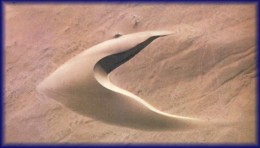|
The Lord God made it all
Planetary astronomers are having a whale of a time; spectacular advances in telescope technology are translating into the discovery of previously unknown planets dotted around our solar system. Every discovery seems to elicit a new wave of oohing and aahing on the part of scientists as they are confronted by phenomena they had never dreamt of let alone predicted. Those who love God's works (Ps. 111:2) cannot help but be stirred at the thought of yet more testimony to the genius of our Creator provided by these exciting finds. But you know something - you and I are sitting on a massive piece of unique real estate that ought to set our hearts a'singing with worship towards the One who made it. Stating the obvious? Perhaps, but it's a truth so sublime it warrants oft repetition.
The God of the Bible, the One True God, takes the credit for Planet Earth's spectacular features:
Where were you when I laid the foundations of the earth? Tell Me, if you have understanding. Who determined its measurements? Surely you know! Or who stretched the line upon it? To what were its foundations fastened? Or who laid its cornerstone. (Job 38:4-6).
You can see, smell, taste, feel and listen to many of His planetary inventions yourself. You don't need to traverse the immensity of space to experience them. To the day you die, you will never regret taking a passionate interest in the harmonies of the sphere around you - its rocks, clouds, rivers, mudflats, mountains and sandy beaches. May I ever so 'umbly encourage you to read about them, touch them, observe them. And remember to worship their Maker. Members of the local field naturalists club Martha and I belong to are enthralled by nature in all its forms, animal, vegetable and mineral. If only they would give the credit to Jesus Christ and the Father.
You don't need to spend lots of money to participate in the spirit-lifting sport of earth watching. The home page of The International Sand Collectors Society hits the nail on the head:
There is however, one important factor in becoming a psammophile [sand lover] and that is the ability to observe and wonder. This is key.
What excellent advice they give - observe and wonder. True, a hand lens or a microscope won't go astray in enhancing the joy of discovery, but they are not essential. You can observe earth's wonders with an artist's eye or, if you prefer, a scientist's eye. God is responsible for both the beauty and the wonder of all things material. Better still,
|
why not do both - be attuned to nature's patterns and beauty as well as being alert to its wondrous behavior.
Take sand, for instance. An artist will note changing shadows on sand dunes, or the patterns sand makes when chased by the wind or harried by running water. The scientist will wonder about its properties. If you have never done this before, walk up a sandy beach from the water's edge to its top end observing the sudden transitions in properties as you go. I have observed five distinct zones, from slushy where the waves lap, through almost hardpan, to soft and foot-grabbing at the top. All the differences are due (I assume) to variations in water content. One day I hope to read more about the magical interplay between sand and water. (I did read the other day that quicksand occurs where water is rising upwards through sand with just sufficient pressure to force the grains slightly apart. Fascinating.)
Further, you can take observing and wondering to whatever level you desire, from the mere recognition of the wondrousness of some object to an in-depth study. Do a little reading and who knows - you, too, may become a sand freak and join a sand collectors club. After all, sand and its rocky form, sandstone, "contain more information than any other sediment" (Raymond Siever, Sand). Did you know that sometimes it sings? You could spend the rest of your life learning about sand and never know it all. But what a fascinating insight into the infinite mind of God.
You could ponder its "playfulness", too; what is it about sand that makes it so much fun to play in? Don't forget to give God credit for that, too. You can be sure He had kids in mind when He created the processes that make it.
Perhaps you would prefer mud over sand. Well then, have at it. Read about mud. You'll be amazed. Then go and look for some and play around with it. Observe where it can be found. Why do you find mud in some places and sand in others? There must be a reason. Planet earth is one huge treasure chest of fun, artistic, wondrous jewels - rocks, rainbows, waves, rivers, caves, lakes, lagoons, natural smells and sounds, and so on ad infinitum. Indeed, "the whole earth is full of His glory" (Isaiah 6:3).
How anybody could fail to be stirred to the depths of their being at the contemplation - and observation - of Planet Earth and its wonders is beyond me. How anybody could contend that our planet's staggering diversity of natural wonders and its dynamic, life-sustaining processes are the result of Lady Luck utterly stuns me. How about you?
|




